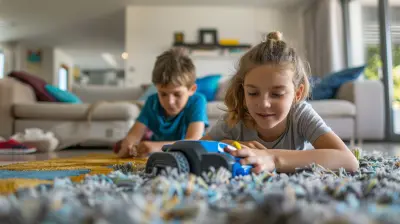Effective Ways to Encourage Early Literacy
21 April 2025
As parents, we all dream of seeing our little ones thrive in reading and writing. But let’s face it—getting them interested in books and letters can be a challenge, especially in today’s world filled with screens and distractions.
The good news? Encouraging early literacy doesn’t have to feel like homework. In fact, it can be fun, engaging, and naturally woven into your daily routines. Whether your child is a newborn or a curious toddler, there are plenty of simple yet powerful ways to spark a love for words and stories.
So, buckle up! Let’s dive into some of the best ways to encourage early literacy in a way that feels effortless and enjoyable.

Why Early Literacy Matters
Before we roll up our sleeves, let’s talk about why early literacy is such a big deal. Early exposure to language—whether through talking, reading, or singing—lays the foundation for:- Stronger vocabulary
- Better communication skills
- Improved listening and comprehension abilities
- A smoother transition to formal reading and writing
Research even shows that children who develop early literacy skills tend to perform better academically later in life. And here’s the kicker: you don’t need fancy programs or expensive gadgets to make it happen. Just a little intentional effort each day goes a long way!

Effective Ways to Encourage Early Literacy

1. Read Aloud Every Day
Reading aloud is hands down one of the best things you can do for your child’s literacy development. Babies may not understand the words at first, but they’re absorbing the rhythm and sounds of language. As they grow, stories help them make sense of the world around them.To make reading aloud even more effective:
- Choose books with colorful pictures and simple, rhythmic text.
- Use different voices for characters to keep it exciting.
- Pause and ask questions like, “What do you think happens next?”
- Let your child turn the pages and interact with the book.
Even just 10–15 minutes a day can work wonders!
2. Talk, Talk, Talk!
Narrate your day like you’re a podcast host! Seriously, one of the best ways to build language skills is by simply talking to your child—about anything and everything.- Describe what you're doing: “I’m cutting an apple. Look, it's red and juicy!”
- Ask open-ended questions: “What do you see outside the window?”
- Engage in pretend play conversations: “This teddy bear seems sad. What should we do to cheer him up?”
The more words your child hears, the bigger their vocabulary bank grows!
3. Sing and Rhyme Together
Ever noticed how kids love songs and rhymes? That’s because music helps them grasp language patterns in a fun, memorable way.- Sing nursery rhymes like "Twinkle, Twinkle, Little Star" or "The Itsy Bitsy Spider."
- Clap along to the rhythm to boost their understanding of syllables.
- Make up silly rhyming words together—giggles guaranteed!
These playful language activities sharpen listening skills and make learning feel like a game.
4. Create a Print-Rich Environment
Your child is constantly absorbing information from their surroundings. So why not fill your home with printed words wherever possible?- Label common objects (“door,” “table,” “chair”).
- Hang up an alphabet chart or a word wall.
- Leave books in easy-to-reach places so your child can explore them anytime.
When kids see letters and words around them, they start understanding that text carries meaning.
5. Make Storytime Interactive
Instead of just reading a book from start to finish, turn storytime into an adventure:- Ask questions: “Why do you think the character is sad?”
- Let them predict the story: “What do you think will happen next?”
- Encourage retelling: Once you've read a book several times, ask your child to "read" it back to you in their own words.
This helps improve comprehension and keeps them engaged.
6. Encourage Scribbling and Drawing
Writing starts way before kids can actually write letters! When toddlers scribble, they’re developing the fine motor skills needed for writing later on.- Give them crayons, markers, and paper.
- Encourage them to draw and “write” their own stories.
- Praise their efforts, even if it’s just random squiggles.
These early doodles eventually transform into letter formations and words.
7. Play with Letters and Words
Who says learning the alphabet has to be boring? Turn it into a hands-on experience:- Use magnetic letters on the fridge.
- Trace letters in sand, shaving cream, or playdough.
- Play simple word games like “I Spy” with letters.
Making letters a part of play makes them more meaningful and exciting.
8. Visit the Library Regularly
Libraries are treasure troves of learning! Take your child on regular trips to explore new books and participate in storytime sessions. Let them pick out books that interest them—having a say in their reading materials makes a big difference.A library visit can also be a great bonding activity and a way to instill the habit of lifelong reading.
9. Lead by Example
Kids love imitating their parents. If they see you reading books, magazines, or even writing grocery lists, they’ll be more inclined to do the same.So, let them catch you reading! Talk about the stories you enjoy and make books a natural part of your home environment.
10. Be Patient and Celebrate Progress
Every child develops at their own pace, so don’t stress if your little one isn’t reading fluently right away. The key is to keep it fun and pressure-free.- Celebrate small milestones: “Wow! You recognized the letter ‘B’—that’s awesome!”
- Offer encouragement: “You’re such a great storyteller!”
- Keep the experience positive and enjoyable.
When kids associate reading with joy rather than stress, they’re more likely to develop a lifelong love for books.

Final Thoughts
Encouraging early literacy isn’t about drilling letters and words into your child. It’s about creating a playful and language-rich environment where reading, talking, and writing come naturally.By making books fun, engaging in conversations, and incorporating literacy into everyday life, you’re setting your little one up for success in the most enjoyable way possible.
So, grab a book, snuggle up, and enjoy the magical journey of words together—one story at a time!
all images in this post were generated using AI tools
Category:
Child DevelopmentAuthor:

Maya Underwood
Discussion
rate this article
4 comments
Thomas McGinnis
Thank you for sharing these insightful strategies! Fostering early literacy is so crucial, and your tips are practical and inspiring.
May 12, 2025 at 4:21 PM

Maya Underwood
Thank you for your kind words! I'm glad you found the strategies helpful for fostering early literacy.
Candace McAdams
In tender whispers, stories bloom, Each page a door, dispelling gloom. With laughter, songs, and words to share, We weave a tapestry of care. Nurture dreams, let young minds soar, In reading’s embrace, they’ll thirst for more.
April 27, 2025 at 3:02 AM

Maya Underwood
Thank you for your beautiful words! They perfectly capture the essence of nurturing a love for reading and the joy it brings to young minds.
Indie Patterson
This article offers such valuable insights! I’m particularly intrigued by the blend of play and reading to foster literacy skills. It’s fascinating how early interactions with books can shape a child's love for reading. I can’t wait to try some of these strategies!
April 21, 2025 at 4:48 PM

Maya Underwood
Thank you for your thoughtful comment! I’m glad you found the insights valuable and that you're excited to try the strategies. Happy reading!
Nymira McRae
Great tips, inspiring ideas!
April 21, 2025 at 3:01 AM

Maya Underwood
Thank you! I'm glad you found the tips helpful and inspiring!



